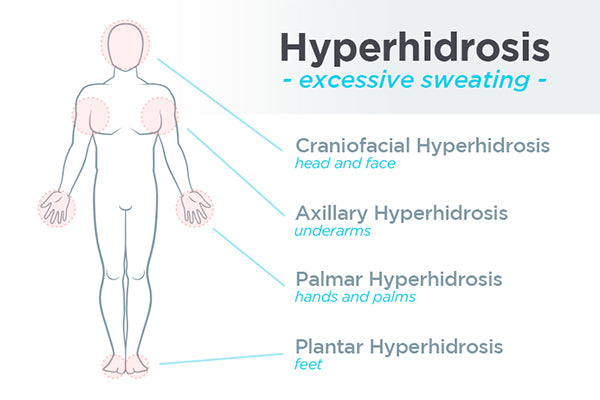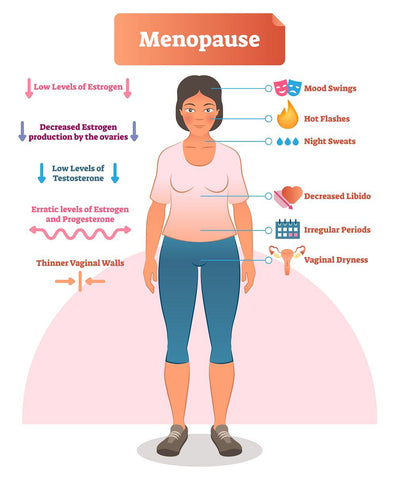Are you experiencing hot flashes and agonizing night sweats? You’re not alone.
The end of a woman’s childbearing years can trigger a hormonal roller coaster with a range of symptoms.
In fact, close to 80 percent of women in menopause experience sudden, sometimes extreme cases of night sweats.
Hot flashes can be defined as unexpected, intense sensations of body heat. Medicine sometimes refers to them as vasomotor symptoms.
They often occur on the face, head and in the chest, face, followed by reddening, sweat, and sometimes chills.
Hot flashes can happen during sleep, accompanied by excessive sweating.
Night sweats, on the other hand, are periods characterized by excessive sweating caused by hyperhidrosis.
This condition usually causes hot flashes that only happen during the night. They are quite intense and have been known to even rouse women from a deep sleep.

Image: Sweatblack
Menopausal hot flashes and night sweats are a natural stage, but they can still cause persistent sleep disruption and general life discomfort.
Making lifestyle changes may not necessarily remove the symptoms of menopause, but they can, however, make them slightly more bearable.
Here are some simple solutions you can use to handle night sweats during menopause:
Stay Away From These Night Sweat Triggers
There are specific conditions that can aggravate your hormones to induce both night sweats and hot flashes. They include:
- Dressing and sleeping in very restrictive or fitted clothes
- Cigarette smoking – including secondhand
- Using very heavy bed linen
- Consumption of caffeine and alcohol
- A diet mainly consisting of spicy foods
- Badly ventilated rooms and spaces
- Excessive stress and anxiety
Useful Habits to Help Manage Night Sweats
Calm Bedtime Routines
Research has found that poor sleep habits can have both immediate and long term negative effects on your hormones.
Some routines you can adopt to improve your sleep quality include:
- Reducing your exposure to blue lighting
- Not taking caffeine before you sleep
- Establishing a healthy sleep pattern
- Avoiding long or irregular napping during daytime
- Taking melatonin supplements
Regular Exercise During the Day
Beyond decreasing stress levels, physical activity can significantly ease menopause symptoms, increase the chances of more restful sleep and keep women in control of their bodies.
The best exercises for women in menopause include:
- Cardio workouts
- Strength training exercises
- Yoga and meditation
- Stability and balance moves

Image: MenopauseNow
Changes in Clothing
In order to minimize the intensity of your night sweats and hot flashes, make these tweaks in your closet:
Avoid wearing 100% Cotton – it naturally absorbs moisture and is designed to heat up the body.
Dress in layers – giving you the freedom to make suitable adjustments when your body temperature spikes.
Wear sweat proof undershirts – to allow you the freedom of not dealing with stains on your outer clothes.
Relief During Sleep
Understanding how to quickly manage the symptoms of both night sweats and hot flashes could save you from a night of discomfort. A few more tips to try include:
- Keeping a bedside fan
- Turning thermostats down before bedtime
- Turning your pillows often
- Entirely eliminating bedsheets and/ or blankets
- Changing into cooler clothes or using none at all
- Using cooling sprays, gels, and pillows
- Drinking cool water
- Keeping ice chips close
- Breathing techniques to help your body relax
Diet Changes
Although researchers are conflicted about how effective food supplements can be in the management of night sweats and hot flashes, some women have found them beneficial.
It’s important to consult a medical practitioner before starting on any food supplements, as they may have side effects or negatively affect other medications.
A few options you may want to try include:
- Whole flax seeds, capsules or oil.
- Soy: Just one or two servings of soy per day can decrease the intensity of hot flashes.
- Evening primrose supplements or oil: Note that they do not interact well with blood thinners and can additionally cause diarrhea and nausea.
- Black cohosh food-grade oil or capsules: Great for short term management of night sweats but can cause other side effects and are not advisable for people with liver issues.
Prescription Therapies or Over-The-Counter (OTC) Supplements
A doctor may prescribe the following treatments after thorough consultation:
- Vitamin B and E
- Advil or Ibuprofen
- Acupuncture
- Low doses of hormone replacement therapy (HRT)
- Neurontin (gabapentin), which is an antiseizure drug for nerve pain, epilepsy, and migraines, but has been found effective for treating hot flashes
- Kapvay (clonidine), used to treat high blood pressure
- Antidepressants such as paroxetine and venlafaxine
- Sleep medications
When to Worry About Night Sweats
In some cases, night sweats might be symptomatic of underlying serious conditions. of something a bit more serious.
Some conditions that cause night sweating include:
Sleep apnea: A severe sleep disorder where a person repeatedly stops breathing in their sleep.
Certain types of cancers such as Hodgkin’s lymphoma, non-Hodgkin’s lymphoma, and leukemia.
There are other serious infections which can also cause night sweats, such as:
- Tuberculosis – an infection of the lungs which is highly contagious and life-threatening.
- Endocarditis – a condition that affects heart valves.
- Osteomyelitis – an infection that affects the bones.
- Brucellosis – an infection caused by interacting with or consuming unpasteurized products from infected animals.
- HIV – Human immunodeficiency virus, which can lead to AIDS if untreated.
- Some tick-borne diseases.
- Neurological disorders such as stroke, syringomyelia, autonomic dysreflexia, and autonomic neuropathy.
If you have been feeling unusually tired and unwell in addition to having night sweats for more than 2 weeks, you absolutely need to see a doctor.
Stay Cool and Dry
The night sweats and hot flashes associated with menopause can truly be challenging.
But with a little time and patience, you can manage the symptoms.
Consider sweat proof clothing for improved sweat relief.
Sweatshield Undershirts are fantastic for wearing as the first layer of clothing. They deal with sweat before it reaches your outer clothes.
How exactly do they keep the sweat in check?
Each of our designs have barriers around the armpits which:
- Stop sweat stains from forming,
- Have an ultra-soft feel,
- Stop odor from getting out of hand, and
- Allow the heat to escape, keeping you cool, all the time.
If excessive sweating has been holding you back from living your best life, give Sweatshield Undershirts a try.
Photo: Bearfotos










